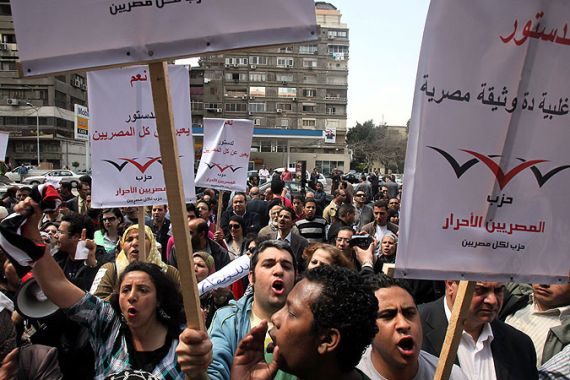Egypt’s liberals quit constitutional meeting
Accusing Islamists of trying to take seats allocated to secular parties, liberals walk out of a constitutional meeting.

Egyptian liberals have walked out of a meeting to select members of a panel to write the country’s new constitution, charging Islamists of trying to take seats allocated for secular parties.
The walkout on Sunday could throw the writing of the constitution, which would lay out the powers of the presidency, into further disarray at a time when uncertainties mar both the course of the presidential runoff election on June 16 and 17 and the legality of parliament.
The dispute was part of the continuous turmoil Egypt has undergone since last year’s overthrow of longtime autocratic leader Hosni Mubarak.
Sunday’s dispute followed a walkout earlier this year by liberals, joined by a representative of Egypt’s premier Islamic institution, Al-Azhar, in protest at the Muslim Brotherhood and ultraconservative Salafists taking most of the seats during the first attempt to select the panel writing a new constitution.
That panel was dissolved in April after the pullout.
It appeared the problem had been solved a few days ago when the country’s ruling generals and 22 parties agreed that Islamists would have just half of the seats on the 100-member panel to draft the new constitution.
Legislator Emad Gad of the liberal Free Egyptians Party said his group and others met on Sunday to discuss their nominees for Tuesday’s panel selection when the dispute surfaced.
The powerful Brotherhood and Salafist Nour Party, who together won 70 per cent of the seats in parliament, were not present when the liberals walked out.
“We were talking about the division of seats between secular and Islamists as 50-50. Then we were surprised to find that all 50 were just for the Muslim Brotherhood and Salafis,” said Gad.
He said the Brotherhood and ultraconservative Salafisys wanted 50 of the 100 seats on the panel for their members only and to push other Islamists into slots meant for secular parties and civil society.
He said that the Islamist Wasat Party and the more radical Gamaa Islamiya, who were present in Sunday’s meeting, were promoting their nominees for seats meant for seculars.
If the Brotherhood and Salafists take 50 seats for themselves, and 21 seats go to government institutions, it would leave just 11 seats for the remaining parties in parliament and 18 seats for “the rest of Egypt”, Gad said.
A fragmented process
The four liberal parties who walked out plan to hold a meeting on Monday to discuss what to do next.
Some seculars, like the Wafd Party, said those who walked out were trying to derail the process.
Muslim Brotherhood spokesman Mahmoud Ghozlan said it is a case of the minority party trying to push its agenda on the majority.
“They control maybe six or seven per cent in parliament, but they want to force their opinion on the almost 94 per cent,” Gholzan said.
The dispute follows repeated promises by the parliament speaker, Brotherhood member Saad El-Katatni, that the constitution will represent all Egyptians.
The political fallout from the first panel dispute eroded voter confidence in the Brotherhood’s ability to work with others.
Their presidential candidate, Mohammed Morsi, has pledged to form a broad-based government if elected, but his rival, Ahmed Shafiq, who was Mubarak’s last prime minister, counters that the Brotherhood wants to take Egypt back to “the dark ages”.
Shafiq’s candidacy itself could be decided on Thursday when the country’s Constitutional Court may rule on the legality of a law aimed at disqualifying him from the presidential race for serving as Mubarak’s premier.
Egyptians also await the court decision that day on a ruling by a lower court that found laws governing parliamentary elections were illegal. If the ruling is upheld, parliament could be dissolved.